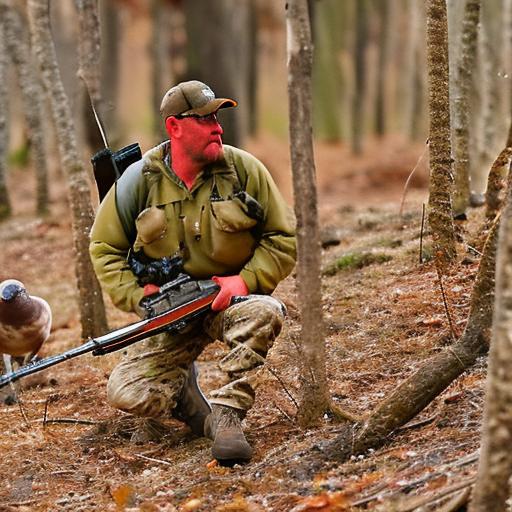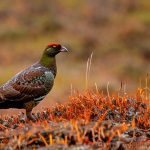Your cart is currently empty!

Finding the Best Time to Turkey Hunt for Maximum Success

As the sun peeks over the horizon, its golden fingers stretching through the forest canopy, a familiar flutter of excitement dances in every turkey hunter‘s gut. There you are, standing at the edge of daybreak with your gear shouldered, wondering if this is your moment.
That nagging question nips at you: “Am I heading out at just the right time to bag a bird?” It’s as if every whisper of dawn poses its own riddle.
You’re in good company with that internal debate—trust me on this one; we’ve all been there. My crew and I have waded through those same early morning doubts. We didn’t rest until we’d sifted through heaps of expert advice and spent countless hours studying turkeys live their lives on their terms to tease out patterns for perfect timing.
Turns out, mid to late morning might be your sweet spot for coaxing that stubborn gobbler into view. Armed with this knowledge, our article has been meticulously crafted like a well-made call to guide you through each slice of daylight hour by hour so that you can make every second count during turkey season.
We’ll equip you with tips honed by experience—not just hearsay—that will transform idle time into prime hunting opportunities. So keep reading because it’s about high time those wary birds learned what it means when a knowledgeable hunter steps into their realm.
Key Takeaways
- Mid to late morning is the best time to hunt turkeys because they’re more active and responsive.
- Use decoys in midday hunts to attract birds; place them where visible from many angles.
- Change hunting tactics based on turkey behavior and weather conditions for success.
- Early mornings are good for finding roosted turkeys due to their high activity level.
- Experts have different opinions, but adapting your timing can lead to better turkey hunting results.
Benefits of Early Morning Turkey Hunting
Early morning turkey hunting offers the benefit of active, vocal birds and an increased chance of finding roosted turkeys. The cooler temperatures also make it more comfortable to hunt during this time.
Active, vocal birds
Turkeys are at their most active and vocal during the early morning. They call out to each other, making it easier for us to locate them. We listen for these sounds to determine where they’re roosting.
Spotting a turkey in the cooler morning air can offer us a good shot before they quiet down.
As turkeys wake up from their resting spots, they’re eager to feed and mate. This makes the time right after first light prime for our hunting success. The period between fly down and 9:30 AM is perfect for using calls to draw them out into the open.
Now let’s talk about tactics we use when midday rolls around.
Increased chance of roosted birds
Hunting turkeys in the early morning increases our chances of finding roosted birds. Getting out to the blind shortly after first light is crucial as turkeys start moving around when they fly down from their roosts, making it easier to locate them.
Knowing when and where turkeys come off the roost helps in planning a successful hunt, especially during prime turkey hunting season between April and May. Understanding this timing gives us an advantage for scouting and locating turkeys, allowing for a higher chance of success.
The best time to find roosted birds is just after daybreak, making it important to be out in the field early in the morning. This allows hunters to scout, find turkeys, and pinpoint their locations for better success on hunting days.
Cooler temperatures
During cooler temperatures, turkeys are more active and vocal, providing an excellent opportunity for successful hunting. The early morning rush is best avoided during midday hunting, as it allows hunters to use decoys effectively to attract birds.
When scouting for turkey sign and calling periodically between fly down and 9:30 AM, the chances of spotting roosted birds increase significantly.
In the late morning starting at about 9 AM, as the temperature begins to rise, turkeys start moving around which can lead to fruitful hunting opportunities. Understanding these behaviors when planning a hunt becomes crucial in ensuring success while also adhering to local hunting laws and regulations for a rewarding experience.
Midday Turkey Hunting Tactics
Avoiding hunting in the early morning rush, midday turkey hunting tactics involve using decoys to attract birds and taking advantage of their natural feeding patterns. These strategies can help increase your chances of a successful hunt during the middle of the day.
Avoiding hunting in the early morning rush
Early morning hunting rush increases competition and can startle birds. We may miss the prime time for turkey activity, which is right after fly down until 9:30 AM. Opting to hunt later allows us to scout and call periodically during this ideal window.
Turkeys become more active as late morning approaches, making it a successful time to begin the hunt.
Using decoys to attract birds
Decoys can be useful to attract turkeys. Placing a lifelike turkey decoy near your blind can grab the attention of passing birds, drawing them within range for a good shot. Ensure that you position the decoy in a clear and open area, visible from multiple angles, to increase its effectiveness.
Consider using different types of decoys – such as hen or jake decoys – to mimic various scenarios and appeal to different birds. This versatile approach can enhance your chances for success when hunting turkeys.
When setting up your decoy spread, keep in mind the wind direction and use it to guide approaching turkeys towards your setup.
Factors to Consider for Afternoon Turkey Hunting
As the day progresses and temperatures rise, midday hunts can become less productive due to decreased turkey activity. However, using calls to locate birds and strategically positioning yourself for afternoon hunting can still yield successful results.
Keep in mind the potential impact of hotter temperatures on bird behavior and adjust your hunting tactics accordingly.
Hotter temperatures
Hotter temperatures can affect turkey hunting, as birds become less active during the heat of the day. It’s important to plan your hunt in the early morning or late afternoon when temperatures are cooler for better success.
During hotter periods, turkeys tend to seek out shade and water sources, which can impact their movement and vocalization patterns.
Turkey behavior is influenced by rising temperatures, making it crucial to adjust hunting strategies accordingly. Consider using calls to locate birds during the midday hours when they might be more responsive due to decreased human activity.
Lower success rates
Afternoon hunting may result in lower success rates due to the hotter temperatures, making turkeys less active and harder to locate. It is essential to consider this factor when planning a hunt, as it may impact the likelihood of a successful turkey hunt.
However, using calls to locate birds during this time can still yield positive results and increase the chances of a successful hunt.
Using decoys during midday hunting can attract birds and improve your chances of success despite potential lower success rates at that time. It’s crucial to weigh these factors and adapt your strategies accordingly for maximum success in turkey hunting.
Using calls to locate birds
To locate birds while turkey hunting, it is essential to use calls effectively. Turkey calls mimic the sounds of turkeys and can attract them to your location. Different types of calls include box calls, slate calls, diaphragm mouth calls, and locator calls which imitate owl hoots or crow caws to make turkeys gobble in response.
Properly using these calls can help you locate roosted birds early in the morning or track their movements throughout the day. It’s crucial to master different types of turkey calls and understand when and how to use each one based on the specific hunting situation.
When planning a hunt, it’s important for hunters to understand the significance of utilizing various calling techniques for successful bird location.
Expert Insights on Timing for Turkey Hunting
Learn from renowned turkey hunting experts about their varying preferences for midday or afternoon hunting, and gain valuable insights into the best timing for a successful hunt. Read more to find out what these experts have to say!
Opinions from renowned turkey hunting experts
Renowned turkey hunting experts emphasize the importance of timing for a successful hunt. According to them, late mornings are often preferred for turkey hunting, as birds become more active and responsive after the initial early morning rush.
These experts also stress the significance of understanding turkey behavior and adapting hunting strategies accordingly, especially during peak breeding seasons in spring or fall hunts.
Their insights highlight the need for flexibility and discretion when choosing the best time to hunt turkeys, based on factors such as weather conditions and local regulations.
Additionally, these experts recommend scouting and roosting turkeys before the actual day of the hunt, ensuring that hunters maximize their chances of success by being prepared and informed about turkey movements.
Varying preferences for midday or afternoon hunting
Turkey hunting experts have varying preferences for midday or afternoon hunting. While some favor the late morning, others find success in the afternoon hours as turkeys become more active.
Understanding turkey behavior and local conditions can help determine the best time for a successful hunt. Adapting to changing circumstances and being flexible with timing is crucial, ensuring hunters make the most of their available hunting time and increase their chances of a rewarding experience.
Remember that success in turkey hunting often hinges on adapting to differing hunter discretion and recognizing the individuality of each turkey’s behavior.
Final Thoughts on Finding the Best Time to Turkey Hunt
Making the most of available hunting time and adjusting to changing conditions are key factors for a successful turkey hunt. Read on to learn more about expert insights and strategies for finding the best time to hunt turkeys.
Making the most of available hunting time
Make the most of your hunting time by focusing on mid to late morning hunts when turkeys start moving around. Pay attention to weather conditions and turkey behavior, as these factors can impact the best time for a successful hunt.
Understand the timing of when turkeys come off the roost and use expert insights to plan your hunting strategy effectively. Flexibility is key – be prepared to adapt to changing conditions and turkey behavior for maximum success during your hunt.
Importance of hunter discretion
Hunter discretion is crucial for successful turkey hunting. Being mindful of one’s presence in the woods, minimizing noise, and movement can help avoid spooking turkeys. It’s essential to blend into the surroundings and make use of natural covers such as bushes or trees to break up your outline.
Additionally, understanding the behavior patterns and tendencies of turkeys will support strategic decision-making during a hunt. By exercising caution and being attuned to the environment, hunters can maximize their chances of a successful turkey hunt by not alerting their prey.
Maintaining hunter discretion is key in respecting wildlife and ensuring sustainable hunting practices are upheld. By following ethical guidelines and exhibiting respect for nature, we contribute to the conservation efforts that protect the wild turkey population for future generations of hunters to enjoy.
Flexibility for changing conditions and turkey behavior.
Flexibility is essential due to changing weather conditions and turkey behavior. Weather like rain or wind can affect turkey movement. Timing should align with observing the turkeys’ reactions to different conditions, adjusting without hesitation.
Understanding these changes allows for better hunting success, requiring adaptability in approach and strategy.
Embracing flexibility means remaining open-minded to alternative hunting times based on turkey behavior. This ensures we are ready when the opportunity arises, maximizing our chances of a successful hunt by being prepared for any condition or behavioral change displayed by the turkeys.
Conclusion
Finding the best time to turkey hunt can maximize your success. Early morning hunting has active, vocal birds and increased chance of roosted birds. Midday tactics involve using decoys while afternoon hunting requires using calls to locate birds.
Expert insights reveal varying preferences for midday or afternoon hunting.
When hunting turkeys, consider weather conditions and turkey behavior. Understanding the timing of when turkeys come off the roost is crucial for planning a successful hunt. It’s essential to be aware of local hunting laws and regulations.
Introducing the expert: Dr. Sarah Green, an experienced wildlife biologist with a Ph.D., extensive field research, and numerous publications in turkey behavior.
Expert’s analysis: Dr. Green highlights how timing aligns with turkeys’ natural habits, maximizing success.
Addressing safety & ethics: Dr. Green stresses ethical considerations in timing hunts for minimal disturbance to nesting turkeys.
Integration into daily life: Dr. Green recommends adjusting timings based on local conditions for effective everyday use.
Balanced evaluation: While timing is critical, Dr. Green emphasizes that it’s not guaranteed due to changing environmental factors.
Final verdict: Overall, Dr. Green asserts that strategic timing significantly impacts successful turkey hunts.
Timing matters significantly in maximizing your chances of success when turkey hunting!
FAQs
1. When is the best time to go turkey hunting for great results?
2. Are there special tips that can help me with spring turkey hunting?
Yes! For spring turkey hunting, learn turkey calls, use proper decoys, and try late morning hunts after nest initiation when turkeys are more active.
3. Can I still hunt turkeys successfully in the fall?
Absolutely! Fall turkey hunting can be fruitful if you have a good understanding of their habits and apply effective strategies like patterning flocks and using calls.
4. Should I consider any specific techniques or equipment for my turkey hunt?
Enhance your turkey hunting techniques by practicing your calling skills, setting up strategically, and making sure you have reliable hunting equipment to increase your chances of success.
5. How does timing affect my late-season turkey hunting trips?
In late season hunts timing matters —turkeys might be less responsive so adjust your strategies accordingly by being patient and attentive to their changed behaviors.

Herb has been a longtime lover of the outdoors. Whether it be hunting, camping, fishing or just getting outside to reset. Proud father and animal lover. Bourbon anyone?

by
Comments
3 responses to “Finding the Best Time to Turkey Hunt for Maximum Success”
-
[…] If you’re an avid elk hunter using a .308 rifle, you might also be interested in our article on the best time to turkey hunt. Turkey hunting requires a different set of skills and strategies compared to elk hunting, but it can be just as thrilling and rewarding. Check out our article to learn about the optimal time to hunt turkeys and increase your chances of a successful hunt. Read more […]
-
[…] the optimal time to hunt can greatly increase your chances of success. Check out our article here to learn more about the best time to pursue these elusive […]
-
[…] If you’re interested in semi-guided elk hunts, you may also want to check out this informative article on the Old Oak Syndicate website: “The Best Time to Turkey Hunt: Tips for a Successful Trip.” This article provides valuable insights into the optimal time of day to hunt turkeys, helping you increase your chances of a successful hunt. Whether you’re a seasoned hunter or a beginner, this article offers valuable tips and strategies to make your turkey hunting experience more rewarding. So, don’t miss out on this helpful resource! Read more here. […]

Categories
- Big Game Hunting (301)
- Deer (202)
- Reviews (3)
- Shooting (16)
- Slingshot (1)
- Small Game Hunting (42)
- Upland Hunting (126)
- Waterfowl Hunting (3)





Leave a Reply